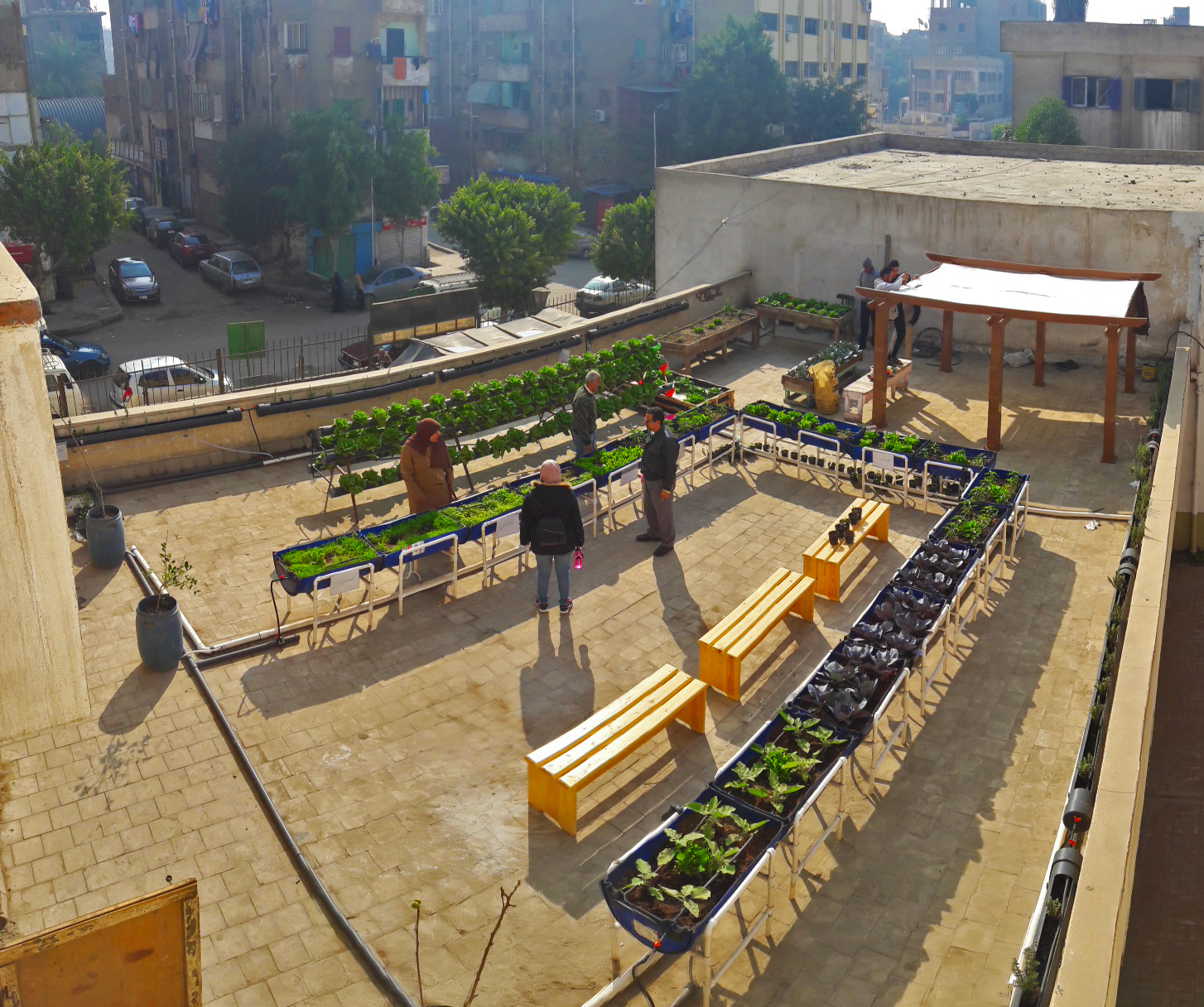By: Sara Mohamed
Senior Environment & Health Reporter
Follow @saraaashraf3
As the possibility of a water crisis and climate change appears more likely to affect agricultural production in Egypt, AUC scientists are transforming rooftops crowded with satellite dishes into gardens that produce crops.
AUC’s Research Institute for a Sustainable Environment (RISE) was featured by the U.S. Forest Service (USFS) on International Day of Forests last month for successfully implementing rooftop garden systems in Greater Cairo, as part of its community development project.
RISE Project Manager Abdallah Tawfik told The Caravan that after extensive applied research at their New Campus premises, alongside the support of USFS consultants, the German Corporation for International Cooperation (GIZ) is funding the implementation of five rooftop gardens at various locations around the Informal Cairo district of El-Matareya.
“While green areas in Cairo are few, buildings are myriad. The rapid population growth, urbanization, degradation of agricultural land, and increase in food prices all make green spaces rare making food access harder for the citizens,” he said.
Rooftop gardening is an alternative food production method that is needed to assist the diets and livelihoods of Cairo’s residents, he added.
The United Nations (UN) warned that Egypt would face water scarcity by 2025.
Meanwhile, the country is suffering from already ongoing water shortage, as the average per capita water use in Egypt is 700 cubic meters annually, according to UN reports in 2016.
Tawfik highlighted that rooftop gardens have environmental, economic, and social benefits, including high-quality food production, sustainable water use management, temperature moderation, and environmental awareness.
“Almost 85 percent of the water resources in Egypt is consumed on agriculture, yet we still use the primitive irrigation methods which wastes tons of liters of water. So rooftop gardening can be an agricultural alternative that will save water for the future,” Tawfik said.
“Till now we’ve fully implemented three rooftops and the other two will be done by July. We are now in the technical follow-up stage where RISE staff makes sure that the crops are in good condition and that they made revenue out of it, to ensure the sustainability of the project,” he said.
The USFS been partnered with RISE in 2012 and has since then been working to replicate complicated systems using local materials as viable alternatives to traditional agriculture in urban communities.
Tawfik explained that USFS consultants worked with RISE staff to develop both a traditional raised-bed, soil-based garden and more recently, a hydroponic garden system.
Through hydroponics, plants grow in a nutrient-rich solution in a soilless bed, and once the water is emptied of its nutrients, additional solution is added and the process continues until plants fully grow.
Tawfik says the implemented model yields 200 lettuce heads per cycle and takes up to 65 days to fully grow and be able to harvest.
He also told The Caravan that GIZ agreed to financially support the rooftop farming pilot project around El-Matareya in particular, considering it as a multi-beneficial deal due to the conditions present in such a condensed area.
Tarek Hosny, co-founder of Schaduf Farms, a leading green roof and wall garden company in Egypt also funded by GIZ, said: “Since the planting environment is controlled by man, summer crops can now be planted in winter and vice versa.”
“It only takes 15 minutes to set up the system on any rooftop and the beds are made up of wood and foam, so it’s an affordable method of planting for such condensed settlements.”
Tawfik also said that a rooftop garden can absorb heavy metals and other pollutants from the air, thus contributing to lessening the overall environmental pollution present in a compact space, like El-Matareya.
“Although that may not be such a great sell for an individual producing crops for the table, but the fact that it’s affordable plus profitable makes rooftop gardening a smart way of impacting the environment and also benefiting the community,” he added.
The project manager told The Caravan that the main advantage of applying rooftop gardens in Egypt, in general, is that it typically uses 85 percent less water than conventional agriculture.
But there are considerable challenges such as the heavy startup costs associated with introducing the project in Egypt.
A conservative cost of the implementation of a replica to the same model RISE implemented ranges from around EGP 17,000 to 20,000.
This then becomes restrictive for low income populations.
New initiatives by the government suggest that there is a growing awareness of the need for sustainable agriculture.
In January, the Ministry of Agriculture and Land Reclamation launched a national initiative to cultivate the roofs of various buildings and establishments through new and innovative models of integrated production.
The main balcony of the ministry’s General Directorate in Dokki was cultivated with hydroponic and aquaponic beds of aromatic plants and vegetables to initiate the nationwide model.
